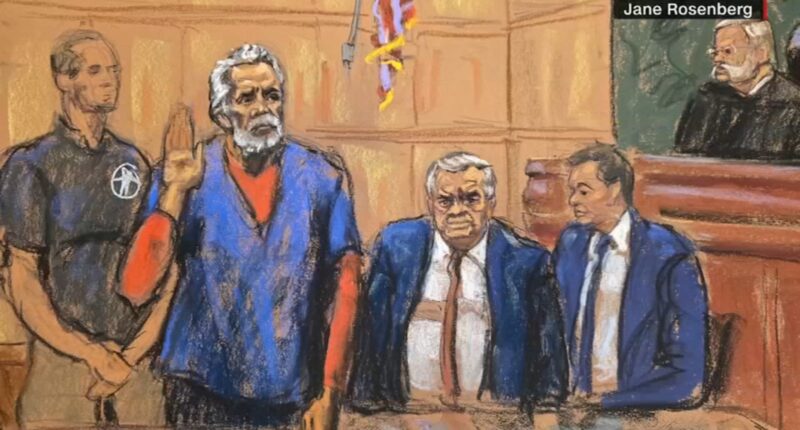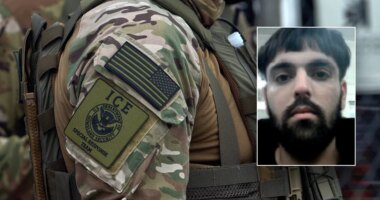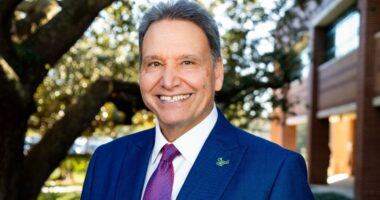Share this @internewscast.com
NEW YORK — On Monday, Ismael “El Mayo” Zambada, a former leader of the Mexican cartel, admitted guilt to U.S. drug trafficking accusations. He expressed remorse for contributing to the flow of cocaine, heroin, and other illegal drugs into the U.S. and inciting violence in Mexico.
“I understand the significant damage that illegal drugs have caused to individuals in the United States and Mexico,” he conveyed through a Spanish interpreter. “I apologize for all of it, and I accept responsibility for my actions.”
With Zambada and Joaquín “El Chapo” Guzmán at the helm, the prosecution claims that the Sinaloa cartel transformed from a local group into the largest drug trafficking entity globally.
By pleading guilty, Zambada admitted to the breadth of the Sinaloa network, including associates who established ties with Colombian cocaine producers, oversaw cocaine importation to Mexico via sea and air, and trafficked drugs across the U.S.-Mexico border. He admitted to bribing Mexican law enforcement and military officials to allow unchecked operations, dating back to the cartel’s early days.
He recounted his start in drug trafficking as a teenager, initiating with marijuana cultivation in 1969. He later dealt heroin and other substances, focusing primarily on cocaine, admitting that from 1980 until the previous year, he and his cartel were accountable for moving over 1.5 million kilograms of cocaine, mainly to the United States.
Zambada delivered his plea in a Brooklyn federal court shortly after prosecutors decided not to pursue the death penalty. Instead, he is scheduled for a life sentence on January 13.
The 77-year-old pleaded guilty to one count of racketeering conspiracy and one count of running a continuing criminal enterprise. He was arrested in Texas last year.
Prosecutors say Zambada presided over a violent, highly militarized cartel with a private security force armed with powerful weapons and a cadre of “sicarios,” or hitmen, that carried out assassinations, kidnappings and torture.
Lawyers for Zambada didn’t immediately respond to an email seeking comment Friday.
Guzmán was sentenced to life behind bars following his conviction in the same federal court in Brooklyn in 2019. His two sons, who ran a cartel faction, also face federal charges.
The Sinaloa cartel is Mexico’s oldest criminal group, with various incarnations dating to the 1970s. It is a drug trafficking power player: A former Mexican cabinet member was convicted of taking bribes to help the cartel.
Considered a good negotiator, Zambada was seen as the cartel’s strategist and dealmaker, thought to be more involved in its day-to-day doings than the more flamboyant Guzmán. Nevertheless, prosecutors have said Zambada also was enmeshed in the group’s violence, at one point ordering the murder of his own nephew.
In court Monday, he acknowledged the grave human toll of his drug trade, including lethal fighting between his armed guards and cartel rivals.
“These confrontations led to many deaths both of our enemies and of fighters on our side,” Zambada said. “Many innocent people were also killed.”
As he concluded his eight-minute remarks, he apologized “to everyone who has suffered from my actions.”
U.S. law enforcement sought Zambada for more than two decades, but he was never arrested in any country until he was taken into custody in Texas last year. He had arrived in a private plane with one of Guzmán’s sons, Joaquín Guzmán López. Guzmán López has pleaded not guilty to federal drug trafficking charges in Chicago; his brother, Ovidio Guzmán López, pleaded guilty last month.
Zambada has said he was kidnapped in Mexico and taken against his will to the U.S. He had often been at odds with Guzmán’s sons, dubbed the Chapitos, a term that translates to “little Chapos.”
Zambada’s arrest touched off deadly fighting in Mexico between rival Sinaloa cartel factions, apparently pitting his loyalists against backers of Guzmán’s sons.
Copyright © 2025 by The Associated Press. All Rights Reserved.
















